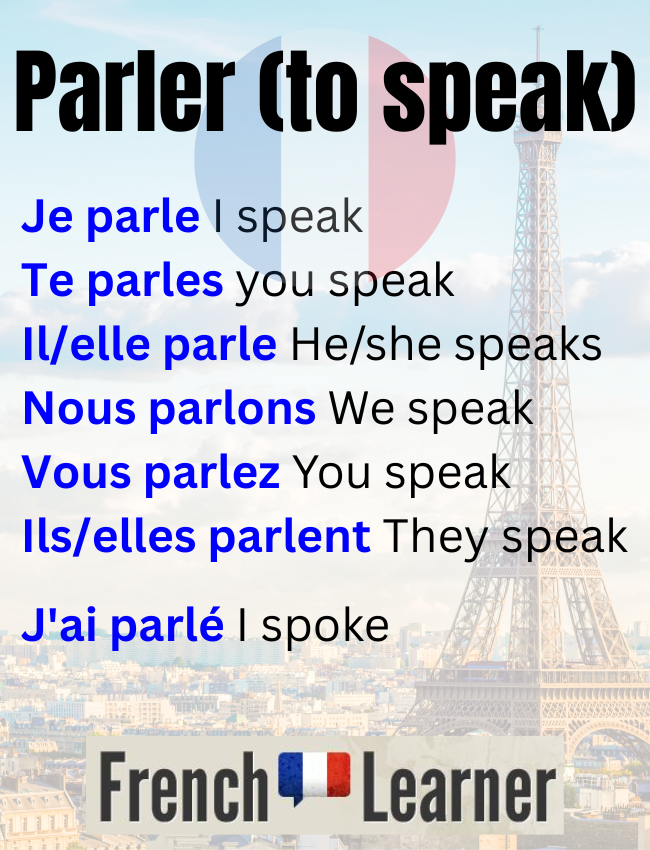(This post is best viewed on a PC or laptop. Hold phone or tablet in landscape to view tables)
Parler (to speak, to talk) is almost always the first verb that students learn. It’s classified as a regular ER verb. This means that its endings are the exact same as all other “regular” verbs that end in -er in the infinitive form. On this post you’ll learn the conjugations for parler in nine major verb tenses with an example sentence for each form.
The conjugation of parler in the present tense is: je parle (I speak), tu parles (you speak), il/elle/on parle (he/she speaks), nous parlons (we speak), vous parlez (you speak, formal and plural) and ils/elles parlent (they speak).

Example sentences with parler
Before we look at the conjugations, here are some example sentences using parler
Je parle français.
I speak French.
Marie parle à son fils.
Marie speaks to her son.
Jacques parle avec son patron.
Jacques is speaking with his boss.
Marc et Sylvie parlent de leur nouvelle maison.
Marc and Sylvie are talking about their new home.
Parler conjugation in French
Before we go any further, let’s take a look at the verb conjugation charts of parler. Further down the page we’ve presented conjugation tables with example sentences.

Parler conjugation tables with example sentences
In the following section we’ll look at conjugation of parler in six major French verb tenses. This page on our site provides a useful explanation of six verb tenses that are necessary to speak fluently.
Present tense
In the present tense, je parle translates to both “I speak” and “I am speaking”.
| Je parle | I speak | Je parle français. | I speak French. |
| Tu parles | You speak (familiar singular) | Tu parles bien. | You speak well. |
| Il/elle parle | He/she speaks | Elle parle espagnol. | She speaks Spanish. |
| Nous parlons | We speak | Nous parlons de Pierre. | We're talking about Pierre. |
| Vous parlez | You speak (formal, plural) | Vous parlez trop fort. | You're speaking too loudly. |
| Ils/elles parlent | They speak | Ils parlent ensemble. | They're speaking together. |
The following YouTube video by Alexa does a great job teaching the pronunciation of parler when conjugated in the present tense.
Passé composé
The second tense we’ll look at is the passé composé, a commonly used French past tense. This page on our site covers the passé composé in detail.
| J'ai parlé | I spoke | J'ai parlé à Pierre. | I spoke to Pierre. |
| Tu as parlé | You spoke (informal singular) | Tu as parlé au téléphone. | You spoke on the phone. |
| Il/elle a parlé | He/she spoke | Il a parlé à sa mère. | He spoke to his mother. |
| Nous avons parlé | We spoke | Nous avons parlé hier. | We spoke yesterday. |
| Vous avez parlé | You spoke (formal, plural) | Vous avez parlé au patron. | You spoke to the boss. |
| Ils/elles ont parlé | They spoke | Ils ont parlé aux enfants. | They spoke to the kids. |
Passé simplé
The passé simplé is a past tense that appears mainly in literature. It is grammatically equivalent to the passé composé.
| Je parlai | I spoke | Je parlai au téléphone avec ton père. | I spoke on the phone with your father. |
| Tu parlas | You spoke (informal, singular) | Tu parlas beaucoup mais tu ne rien dis. | You spoke a lot but didn't say anything. |
| Il, elle parla | He, she spoke | Elle para à son fils cinq fois. | She spoke to her son five times. |
| Nous parlâmes | We spoke | Nous parlâmes ensemble au restaurant. | We spoke together at the restaurant. |
| Vous parlâtes | You spoke (formal, singular) | Vous parlâtes avec toute la famille. | You spoke with the entire family. |
| Ils, elles parlèrent | They spoke | Ils ne parlèrent pas du sujet. | They didn't speak about the subject. |
Imperfect tense
The imperfect tense, or imparfait is another commonly used French past these. Je parlais can translate to “I was speaking”, “I used to speak” and “I spoke”. This page on our site covers the imperfect tense in detail.
| Je parlais | I used to speak | Je parlais à Martin quand tu es arrivé. | I was speaking to Martin when you arrived. |
| Tu parlais | You used to speak | Tu parlais allemand quand tu étais un enfant. | You used to speak German when you were a child. |
| Il/elle parlait | He/she used to speak | Elle parlait français pendant son enfance. | She used to speak French during her childhood. |
| Nous parlions | We used to speak | Nous parlions de vous quand vous avez téléphoné. | We were talking about you when you called. |
| Vous parliez | You used to speak | Vous parliez couramment avant. | You used to speak fluently. |
| Ils/elles parlaient | They used to speak | Avant ils se parlaient tout le temps. | They used to speak to each other all the time. |
Future tense
The following table is of parler conjugated in the futur simple tense. This page on our site covers the two main French future tenses.
| Je parlerai | I will speak | Un jour, je parlerai couramment. | I will speak fluently some day. |
| Tu parleras | You will speak (singular informal) | Un jour, tu parleras le japonais. | Someday you will speak Japanese. |
| Il/elle parlera | He/she will speak | Il parlera avec sa femme. | He will speak with his wife. |
| Nous parlerons | We will speak | Nous parlerons au patron. | We will speak to the boss. |
| Vous parlerez | You will speak (formal, plural) | Vous parlerez du projet. | You will speak about the project. |
| Ils/elles parleront | They will speak | Ils parleront après le cours. | They will speak after the class. |
Futur proche
The futur proche, or the near future tense, equates to “going to” in English. It is formed by combining the present tense of aller (to go) with the infinitive. Je vais parler translates to “I am going to speak”.
| Je vais parler | I am going to speak | Je vais paler à ton frère. | I'm going to speak to your brother. |
| Tu vas parler | You are going to speak (familiar, singular) | Tu vas parler de ton voyage. | You're going to talk about your trip. |
| Il, elle va parler | He, she is going to speak | Elle va parler à ses enfants. | She's going to speak to her kids. |
| Nous allons parler | We are going to speak | Nous allons parler du nouveau projet. | We're going to talk about the new project. |
| Vous allez parler | You are going to speak (formal, plural) | Vous allez parler très couramment un jour. | You are going to speak very fluently some day. |
| Ils, elles vont parler | They are going to speak | Ils vont parler des nouvelles solutions. | They're going to talk about the new solutions. |
Conditional tense
The conditional tense is the “would tense”. Hence, je parlerais means “I would speak”. This page on our site covers the conditional tense in detail.
| Je parlerais | I would speak | Je parlerais à Jean si j'avais le temps. | I would speak to Jean if I had the time. |
| Tu parlerais | You would speak (singular, informal) | Tu parlerais le français si tu étudiais un peu. | You would speak French if you studied a bit. |
| Il/elle parlerait | He/she would speak | Il parlerait le chinois s'il habitait en Chine. | He would speak Chinese if he lived in China. |
| Nous parlerions | We would speak | Nous parlerions ensemble mais ce n'est pas possible. | We would speak together but it's no possible. |
| Vous parleriez | You would speak (formal, plural) | Vous parleriez l'espsgnol si vous habitez au Mexique. | You would speak Spanish if you lived in Mexico. |
| Ils/elles parleraient | They would speak | Ils se parleraient plus souvent mais ils n'ont pas le temps. | They would speak to each other more often but they don't have the time. |
Subjunctive mood
The following table shows the conjugations for parler in the subjunctive mood, which is a tense that’s often used for expressing wishes, emotions and doubts.
| que je parle | that I speak | Il faut que je parle français en France. | I have to speak French in France. |
| que tu parles | that you speak (singular, informal) | Je veux que tu parles plus fort. | I want to to speak louder. |
| qu'il/elle parle | that he/she speaks | Je doute qu'elle parle le chinois. | I doubt she speaks Chinese. |
| que nous parlions | that we speak | Il faut que nous parlions demain. | We need to speak tomorrow. |
| que vous parliez | that you speak (plural, formal) | Je suis heureux que vous parliez ensemble. | I am happy you are speaking together. |
| qu'ils/elles parlent | that they speak | Je suis ravi qu'ils parlent le japonais. | I'm delighted they speak Japanese. |
Imperative mood
The imperative mood is used for giving commands. Parle! translates to “speak!”.
| Parle! | Speak! (informal, singular) | Parle plus fort! | Speak louder! |
| Parlons! | Let's speak! | Parlons français! | Let's speak French! |
| Parlez! | Speak! (formal, plural) | Parlez moins fort! | Speak softer! |
Suggested resource:
One of the most daunting areas that all beginners face is figuring out the right approach to learning French verb conjugations. I have been working with Camille from Frenchtoday.com since 2016 and strongly suggest looking at her post entitled The Secret To Mastering French Verb Conjugation.
Discover more conjugation charts with example sentences:
- Être (to be)
- Avoir (to have)
- Aller (to go)
- Faire (to make, to do)
- Vouloir (to want)
- Pouvoir (can, to be able)
- Aimer (to like, to love)
- Boire (to drink)
- Manger (to eat)




